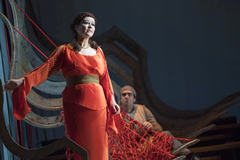| Opera Reviews | 4 May 2024 |
ETO's Ulysses' Homecoming is a joy to watch
|
|
Monteverdi: Ulysses' Homecoming |
|
|
The words come at the end of Monteverdi’s opera, in Anne Ridler’s version of Giacoomo Badoara’s libretto after Homer, as Penelope and Ulysses are reconciled after his wanderings. Neptune and Minerva’s power struggle has ended in a score-draw, the importunate Suitors are dead and their minion Irus has skedaddled. Telemachus, the son of Ulysses and Penelope has come home – but maybe it’s a tad tactless to drone on to Mummy about Helen’s charms quite so soon after, hm? Director James Conway’s design team of Takis and Mark Howland provide an uncluttered set – ribs which could be a beached sea-monster, a galley or large bows, and a wall of doors – first floor for the gods, ground floor for the humans. Howland’s lighting is appropriately liquid for scenes with Neptune. The Suitors, Melanto and Eumaeus are in modern Greek frock-like tunics, white with colour at the hem. Benedict Nelson is a strong Ulysses, whether as the limping beggar in rags, or a sailor thrown from the vessel in the storm. When finally he reveals himself to Penelope, he is all in white – as is she, being in reluctant mourning for the suitors. Till then, Carolyn Dobbin’s Penelope is dressed in finely pleated red, so beset with Suitors and her maid Melanto (Martha Jones) banging on about remarrying that even good news can’t get through. When finally it does, we hear her relief in her first aria after all those recitatives. As her son Telemachus, Nick Pritchard is convincingly youthful and exuberant. The joy of old swineherd Eumaeus at his master’s return is palpable - John-Colyn Gyeantey’s duet with Nelson conveying the depth of their understanding of each other. The Suitors multitask in other roles – Clint van der Linde (Pisander) doubles as an excellent Ericlea,, the old nurse, with dowager’s stoop and shuffling gait, particularly in the Act III aria, wondering whether to tell Penelope what she knows. Andrew Slater makes a better Neptune than Antinous, with godlike gravitas. Robert Antony Gardiner’s Eurymachus is good-looking and he knows it, taking Melanto’s affections as a given, and childishly petulant when he fails to string the bow and win Penelope. Best of all, however, is Minerva – Katie Bray strides the stage whether in disguise or not, well up to the challenge of Monteverdi’s fluid lines as much as Neptune’s ill-will at her protégé Ulysses. The Old Street Band provides the music, conducted by Jonathan Peter Kenny, with some nice continuo playing from the theorbos, notably in Penelope’s recitative after the Suitors are killed, and crisp recorders, playing from the circle box.
|
|
| Text ©
Catriona Graham Photo © Richard Hubert Smith |

 ‘Yes, yes, my dearest, yes, yes – yes, yes’ is an apt summing up of Ulysses’ Homecoming, as performed by English Touring Opera,
‘Yes, yes, my dearest, yes, yes – yes, yes’ is an apt summing up of Ulysses’ Homecoming, as performed by English Touring Opera,






